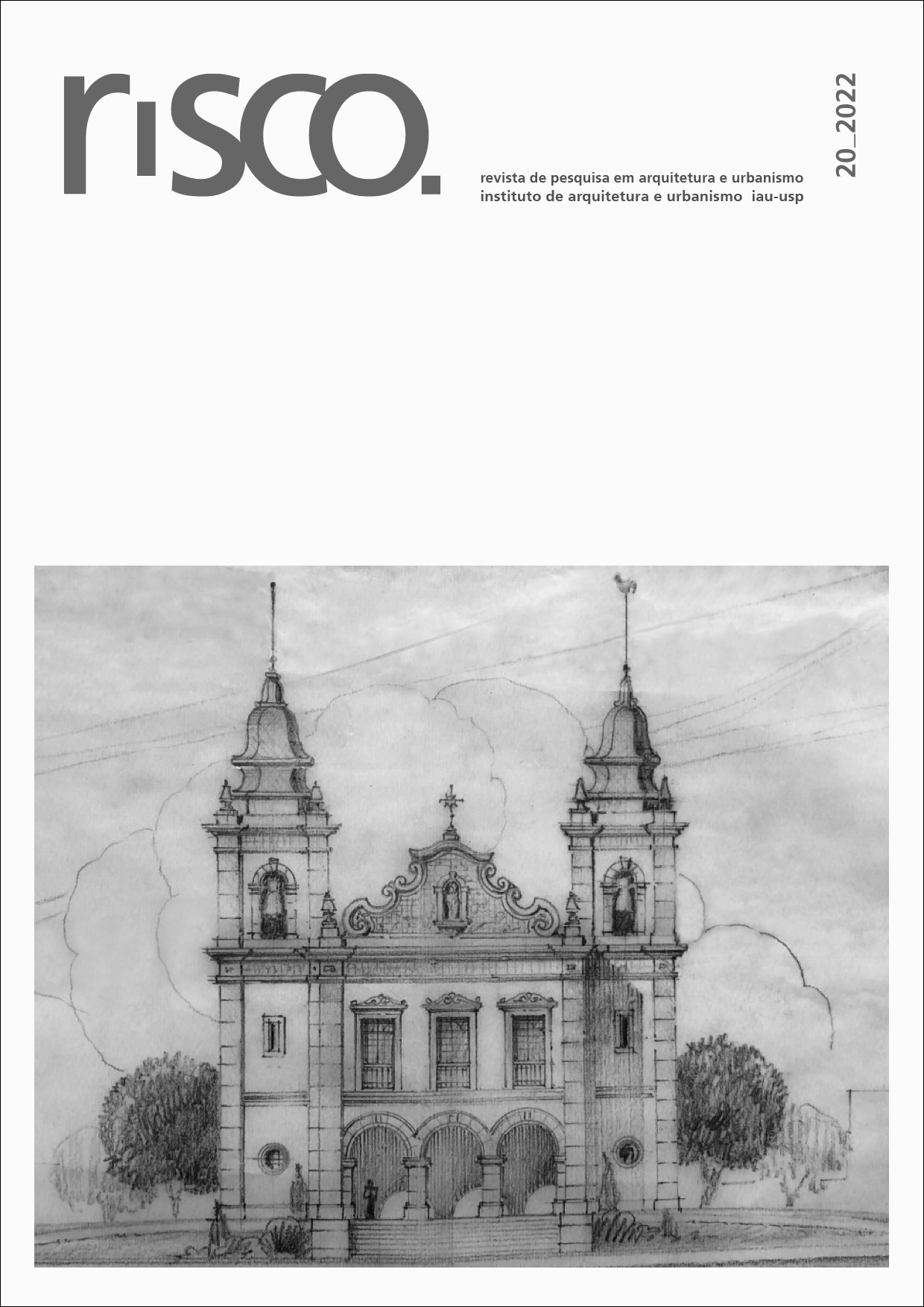The post and its opposite: reflections on the technological morphosis of a new productive arrangement
DOI:
https://doi.org/10.11606/1984-4506.risco.2022.186641Keywords:
productive matrix, technology, natural materialsAbstract
Starting from an analytical approach about the characteristics that conform the current production model and its arrangements in the construction chain, the article proposes a set of theoretical reflections about the possibilities of productive recomposition, pointing to a new arrangement guided by distinct relations of production of construction materials and other socio-technical perspectives of application. The technological morphosis of a new production matrix is configured as an essential condition in face of environmental collapse and factual social crises. In this orientation, the reinsertion of natural materials, of low environmental impact, as triggers for new productive arrangements, potentiates the re-appropriation of the producers in the manufacturing of materials and constructive components, expanding their conditions for productive autonomy, bearer of educational, creative, and emancipatory principles.
Downloads
References
ACOSTA, A. Extrativismo e neoextrativismo, in DILGER, G., LANG, M., FILHO, J. P. (Orgs.). Descolonizar o imaginário: debates sobre pós-extrativismo e alternativas ao desenvolvimento. Tradução Igor Ojeda. São Paulo: Fundação Rosa Luxemburgo, 2016.
ACSELRAD, H. (org.). A duração das cidades: sustentabilidade e risco nas políticas urbanas. 2°ed. Rio de Janeiro: Lamparina, 2009.
ACSELRAD, H.; MELLO, C. C. A.; BEZERRA, G. N. O que é justiça ambiental. Rio de Janeiro: Garamond, 2009.
ARÁOZ, H. M., PERES, J. Mineração, genealogia do desastre: O extrativismo na América como origem da modernidade. Brasil: Editora Elefante. 2020.
BODEN, T.A., MARLAND, G., ANDRES R.J. Global, Regional, and National Fossil-Fuel CO2 Emissions. Carbon Dioxide Information Analysis Center, Oak Ridge National Laboratory, U.S. Department of Energy, Oak Ridge, Tenn., U.S.A., 2017. Doi 10.3334/CDIAC/00001_V2017.
BURCK, J., HAGEN, U., BALS, C., HÖHNE, N., NASCIMENTO, L. Results Climate Mitigation Efforts of 57 Countries plus the EU. Covering 90% of the Global Greenhouse Gas Emissions. Climate change performance index CCPI. Germany, 2021. Disponível em: <https://ccpi.org/download/the-climate-change-performance-index-2021/>.
CORIAT, B. O processo de trabalho do tipo ‘canteiro’ e sua racionalização. Ata do Colóquio “Le travail en chantiers”. São Paulo: mimeo (tradução Jorge Oseki, revisão João Sette Whitaker Ferreira), 1983.
FERRO, S. Arquitetura e trabalho livre. São Paulo, SP: Cosac Naify., 2006.
INTERGOVERNMENTAL PANEL ON CLIMATE CHANGE. Climate Change 2013 The Physical Science Basis Working. Group I Contribution to the Fifth Assessment Report of the Intergovernmental Panel on Climate Change. CAMBRIDGE UNIVERSITY PRESS, 2013. https://www.ipcc.ch/site/assets/uploads/2017/09/WG1AR5_Frontmatter_FINAL.pdf>
LOW CARBON ECONOMY INDEX. Is Paris possible? Publicação PWG France, 2017. Disponível em: <https://www.pwc.co.uk/sustainability-climate-change/assets/pdf/lcei-17-pdf-final-v2.pdf>
MEDEIROS, J.L., BARRETO, E.S. Lukács e Marx contra o “ecologismo acrítico”: por uma ética ambiental materialista. Economia e Sociedade, Campinas, v. 22, n. 2 (48), p. 317-333, agosto, 2013.
OXFAM. Extreme carbon inequality. Why the Paris climate deal must put the poorest, lowest emitting and most vulnerable people first. OXFAM MEDIA BRIEFING, 2015. Disponível em: <https://www-cdn.oxfam.org/s3fs-public/file_attachments/mb-extreme-carbon-inequality-021215-en.pdf>
SIMONDON, G. Do modo de existências dos objetos técnicos, Rio de Janeiro: Contraponto, 2020.
SIMONDON, G. Sur la technique. Presses Universitaires de France, Puf, Paris, France, 2014.
TERNER, I. D., Technology and autonomy, in TURNER, J. e FICHTER; R., Freedom to build: Dweller Control of the Housing Process, Collier Macmillian, New York, - John F C Turner & Robert Fichter, eds., 1972.
Downloads
Published
Issue
Section
License
Copyright (c) 2022 Thiago Lopes Ferreira, João Marcos de Almeida Lopes

This work is licensed under a Creative Commons Attribution-NonCommercial-ShareAlike 4.0 International License.
Autores que publicam nesta revista concordam com os seguintes termos:
a. Autores mantém os direitos autorais e concedem à revista o direito de primeira publicação, com o trabalho simultaneamente licenciado sob a Licença Creative Commons Attribution BY-NC-SA que permite o compartilhamento do trabalho com reconhecimento da autoria e publicação inicial nesta revista.
b. Autores têm autorização para assumir contratos adicionais separadamente, para distribuição não-exclusiva da versão do trabalho publicada nesta revista (ex.: publicar em repositório institucional ou como capítulo de livro), com reconhecimento de autoria e publicação inicial nesta revista.
c. Autores têm permissão e são estimulados a publicar e distribuir seu trabalho online (ex.: em repositórios institucionais ou na sua página pessoal) a qualquer ponto antes ou durante o processo editorial, já que isso pode gerar alterações produtivas, bem como aumentar o impacto e a citação do trabalho publicado (Veja O Efeito do Acesso Livre).
Funding data
-
Fundação de Amparo à Pesquisa do Estado de São Paulo
Grant numbers FAPESP-2018/17446-5

















